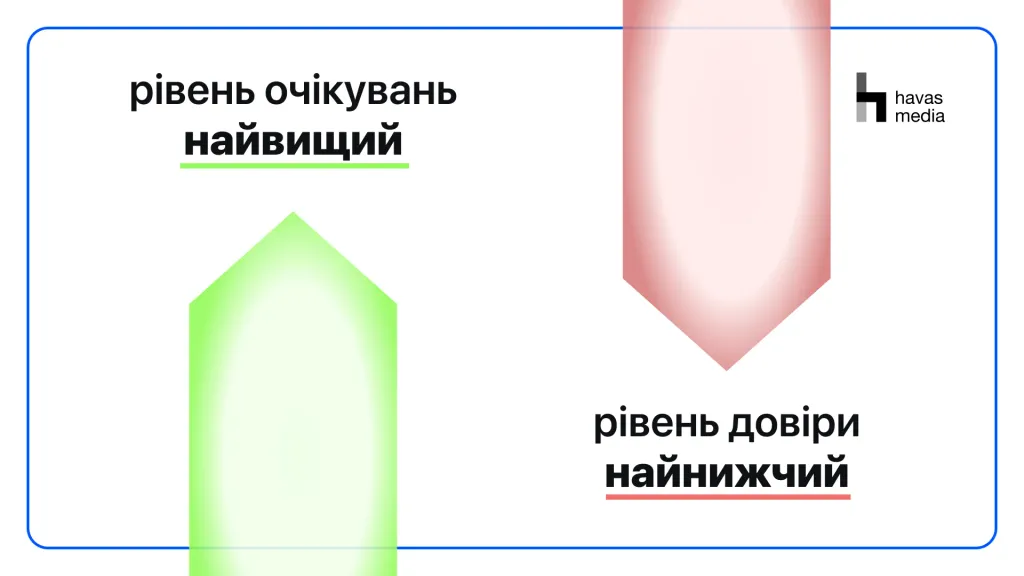Wartime Marketing

The war exposed the helplessness of traditional marketing
At the beginning of a full -scale war, neither brands nor consumers were ready for fear, uncertainty and chaos, that suffered Ukraine. Not surprisingly, traditional approaches to marketing and advertising have lost their meaning and most brands in fact, they became helpless.
The first days of the full-scale invasion of the network were, on the one hand, filled with pre-war advertising creatives, and on the other hand, terrible shots of military operations. Later, apparently feeling the absurdity of such a neighborhood, some companies chose a strategy of complete silence and refused any interaction with the audience. Surprisingly, this was the approach until recently even whole categories of brands were chosen (for example, niches of entertainment and alcoholic beverages). After several months of brand war began to gradually “thaw” - but some did not understand the fundamental importance of the current moment in the life of society nevertheless, they decided to limit themselves to superficial, decorative methods. And it didn’t work.
Indeed, none of these tactics took into account the current audience and their previous experience, and therefore was not effective.
Consumers felt crisis before a full -scale war
It was a period when society had just experienced the biggest waves of the coronavirus pandemic and was gradually learning to adapt to her challenges. During the 2 years of isolation, Ukrainians have developed new consumption trends, some of which have only become more stable through the war
Even before the beginning of the Russian invasion, Ukrainians felt many anxieties that affected the approach to consumption, among them: the need to adjust life in conditions of instability, forced change of traditional rituals and habits, etc. That is, even before the full-scale war, Ukrainians had learned to adapt to stressful conditions.
Havas has been researching consumer values for 12 years
The purpose of the “Meaningful Brands” study is to determine the impact of brands on the lives of consumers. It covers more than 365 thousand respondents, 2000 brands, 30 markets and 21 industries.
In particular, the study compared the behavior of two groups of consumers: prosumers — people who are the first set new trends and respond to changes in society and ordinary consumers (mainstreamers).
Even on the eve of full-scale war, a 2021 study recorded a remarkable rise in cynicism caused by the rift in expectations between consumers and brands. If 75% of brands disappeared overnight, consumers wouldn’t even notice.

In addition, 70% of respondents noted that they are tired of empty promises from brands. This indicator confirms the lack of trust to brands.

Why is this trust broken?
- Brands do not take a transparent position and make vague promises.
- They have no economic or social obligations to society.
- Not offering relevant value-added content and not practicing feedback
- It turns out that even before the war, the level of expectations from brands was the highest, while the level of trust in them was the lowest.
And with these attitudes, people got into wartime.

One of the biggest problems for Ukrainian consumers - life in conditions of complete uncertainty

Even before the war, 43% of respondents agreed with this. This is added to the loss of work and difficulty in finding a new one, and experiences loss of basic experience (inability to travel, attend activities, work offline, change of residence, loss live communication with friends, etc.
Such conditions also influenced the construction of consumer experience.
Even before February 24, almost half of the consumers were inclined towards balanced consumption. In general, lead a more minimalistic way life to help improve the difficult situation in the world, 48% of prosumers and 41% of ordinary people were ready consumers (mainstreamers), respectively 74% and 58% of respondents were ready to abandon fast fashion, and 53% and 47% representatives of two groups — from air travel.

Also, most of the respondents would give preference to work with less salary but with the possibility of balancing more efficiently between work and personal life. This indicates changes in consumer values where personal comfort is first placed But the availability of free time, and then profits and money. In addition, more than 70% of the pioneers (Prosumers) and 77% ordinary consumers (Mainstreamers) would want to do the work that benefits society and is more flexible in compared to others.
Whereas Ukrainians were not ready for more radical action to save the planet. In particular, it is about giving up Birth of children. The positive answers of this issue reached only 31% among the pioneers (Prosumers)and 36% among ordinary consumers.

It also found that 90% and 74% of respondents in the two categories would try to make up for lost time after finishing crisis, and therefore, in the current conditions, will live with the effect of “postponed life”.
However, under pressure, consumers increasingly crave rapid change and expect it from brands.

consumers expect brands to become the driving of changes
Ukrainians believe that the brand should become the same social institution as, say, the government, religious or educational institutions, etc. On average, 87% of respondents expect that large companies should make a positive contribution to the world of tomorrow day Interestingly, these indicators are lower in developed countries and correspondingly higher in developing countries. Part, this happens due to the inefficiency of the existing institutions, as a result of which the business comes to the attention of the consumer, which a change request is now being addressed.

The war only highlighted the inability of some brands to meet the challenges of the times and increased their social issues significance Ignoring by brands the current moment, which plays an important role in the life of society, has sent before them to outsiders, but now it will be perceived as an insult.
Is a brand needed in wartime?
Havas Village Ukraine still hears this question from customers. Like, really, why if the future is as murky as ever? The answer is definitely yes! Because:
- The potential in some categories is stagnating, and therefore, organic growth is impossible.
- The consumer base has shrunk due to migration and other factors, so businesses have to compete harder for the wallets that remain.
- As a result of the devaluation of the hryvnia and the complication of logistics chains, revaluation in some categories of goods has already occurred three or more times. Increasing the added value of the brand remains the only way to retain the consumer.
- Right now is the right time to get into the consumer’s “short list” (consideration set).
However, communication during this period really becomes more complicated due to increased demands on the social mission of brands. The absolute majority of respondents believe that through their decision to buy a particular product, they will be able to influence the social and even political development. That is why it is important to respond correctly to socio-political events and communicate about your own values are a vital necessity for every brand. This coincides with recently published data from Gradus, respectively to which only 21% of consumers choose a brand purely based on the functional characteristics of the product.
What should be marketing of wartime
Not only to keep your audience in difficult times, but also to obtain the commitment of new consumers, brands need very much Be careful in the info space and change the approach in favor of responsible marketing. In particular, it is worth:
- Abandon the strategy of silence and avoidance of public topics that “do not concern” the brand.
- Not to be a parasite on the war and not to use information drives related to it where it is unnecessary and inappropriate.
- Be careful with decorative techniques, such as the use of blue-yellow colors, sunflowers, other Ukrainian symbols or military identities in an inappropriate context.
- Demonstrate a transparent and understandable political, social, environmental and cultural position and confirm it with actions, that benefit people (64% of consumers will prefer brands that care about social issues, rather than purely profit).
- Fulfill what the company promises in its key communication message. Refrain from making unnecessary promises.
- Try to make the brand more human and open — change the focus from the consumer to the person. Do not show desire expect profit from every touch with the consumer.
- Simplify the product consumption experience as much as possible or offer new features that will help people optimize their way life in conditions of martial law and total uncertainty (for example, an online bank launches a new functionality that simplifies calculations in the application for those who have gone abroad or a mobile operator that actually combines the separated family war, offering special tariffs for Ukrainians).
- Maintain optimism and gently entertain, for example by offering appropriate wartime humor.
In general, military communication should adapt to current conditions. A full -scale war changed the life of each person and together with This is her attitude to brands and consumer behavior. When constructing a company marketing strategy have to consider these Changes and create primarily human, sincere and responsible communication in which in the first place will always stand human values.
